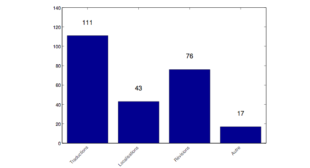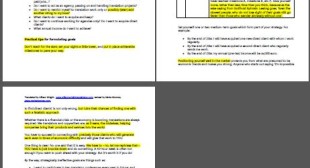Revision
Whenever I get asked to ‘proofread’ something that involves a translation, I make sure to ask what the client actually wants me to do. Should I check the translation against the source text to make sure the translation is correct and fit for its intended purpose? Or should I check the text for spelling and […]
Katell Hernández Morin, « Pratiques et perceptions de la révision en France », Traduire [En ligne], 221 | 2009, mis en ligne le 12 novembre 2013, consulté le 10 mars 2017. URL : http://traduire.revues.org/368 ; DOI : 10.4000/traduire.368 Entre le 14 novembre et le 21 décembre 2007, nous avons soumis aux professionnels de la traduction […]
Katell Morin-Hernandez. La révision comme clé de la gestion de la qualité des traductions en contexte professionnel. Linguistics. Université Rennes 2, 2009. French. (Thèse) 1. Gestion de la qualité des traductions spécialisées professionnelles 2. Contexte didactique et professionnel de la pratique de la révision 3. Cadre méthodologique de l’enquête sur la révision et la […]
By revision I’m referring to a translation being checked against the source by a second translator. A lot of colleagues refer to this as proofreading, but proofreading is a different skill performed by a proofreader who isn’t usually a translator at all. https://nikkigrahamtranix.com
The ultimate checklist to proofread and edit your work. These days, there is a lot of fuss and debate around Post-Editing (and Machine Translation) that made me reflect upon effective editing and proofreading as a key part of my work. Are there revision and proofreading parameters that can be applied to check the completeness and […]
As writers, we all know the importance of proofreading. Without it, a manuscript looks sloppy and unfinished and can even be so difficult or frustrating to read that it leads the reader to simply put down the book altogether. However, how to best go about this challenging yet vital step in the writing process? […]
El concepto de evaluación es polisémico. El DRAE señala que evaluar consiste en ‘señalar el valor de algo’, ‘estimar, apreciar, calcular el valor de algo’ o bien ‘estimar los conocimientos, aptitudes y rendimiento de los alumnos’. Algunos investigadores distinguen entre evaluación (evaluation) y valoración (assessment) y otras definiciones señalan que evaluar es el proceso de […]
Réviser, c’est endosser des devoirs d’examen et d’amélioration du travail d’autrui, si bien que certains traducteurs néophytes appréhendent ce virage. Réussiront-ils à déceler les erreurs et à faire mieux que le traducteur? Ils en doutent parfois. Passons en revue quelques-unes de leurs craintes, puis proposons des pistes pour les rassurer. http://www.circuitmagazine.org
There are two basic truths which apply to the profession of translation: we learn from our mistakes; and we learn from other people. If we are fortunate, we find our errors before delivering our work, or translation errors are discussed with us by mentors, project managers at agencies, or revisors. http://www.allisonwrighttranslations.com
In this post, we’ll look at some of the most common types of client changes and how to handle them. TERMINOLOGY CHANGES The client decided to use a different term. As long as the new proposed term makes sense in the context and renders the source properly, without conflicting with previously-translated materials or a glossary, … […]
Recently my work focus moves slowly from translation to review. And after you perform a review, you often have to document the changes, especially when there is a lot of them. Although the newer CAT tools offer track changes function (available, for example, in memoQ or Trados Studio), the creation of a report readable outside […]
I received an assignment from a long-standing client last week that made my Spidey-sense tingle as soon as I read the instructions. It was billed as a super easy review of a translation done in-house at a hospital which should take no more than half an hour. Uh-huh. http://translationwordshop.com
These days, there is a lot of fuss and debate around Post-Editing (and Machine Translation) that made me reflect upon effective editing and proofreading as a key part of my work. Are there revision and proofreading parameters that can be applied … (Illustration: CC BY-SA 2.0 quinnanya) http://www.francescaairaghi.it
Today, I want to talk a little bit about a term used by work-providers and which greatly irritates many translators: that term is ‘proof-reading’. I don’t know how many times I’ve been asked to ‘proof-read’ a text, only to find that what is actually meant is something else entirely. http://spotlightontranslation.blogspot.be
(e-book extract) The translation should ideally be checked with a revision. The aim of this stage is to verify the accuracy of the translated text in comparison to the source text, as well as to ensure fluency and adaptation to the target audience. The spelling and grammar is also checked, and the choice of terminology […]
Since a recent unpleasant experience I had with a reviewer (also called a proofreader) and because of the discussion developing on Proz.com on the subject of what a proofreader is supposed to do, I thought I’d share my take on the matter. © PIXS00Z-FOTOLIA.COM https://alexandria-translation-resources.com
Is back-translation really the best way to ensure quality of your survey translation? If you’re looking to reduce cost and increase quality, there’s a better way! http://www.languageintelligence.com
(Illustration: Marlène Junius) Conséquence des dernières normes qualité dans le secteur de la traduction, de nombreux fournisseurs de services de traduction imposent révision ou remaniement systématique des textes traduits par un second traducteur, avec l’idée que cela améliore nécessairement la qualité. http://traduire.revues.org



















